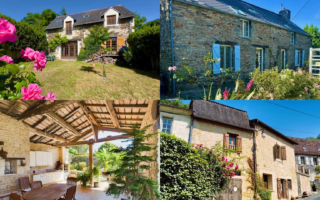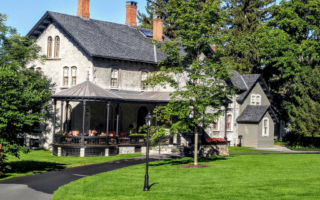A-Z of buying a French property

Get to grips with all the key words and terms you’ll need to know when buying a house in France with our A-Z guide
A is for Area
Once you’ve decided to go ahead and buy a property in France you need to think about the region you wish to buy in so that you can start looking. Within the region you will probably need to concentrate on certain areas, so it’s a good idea to make a list of requirements in order to narrow down the search. Do you need to be near transport links? A big town? The sea? How important is climate to you?
B is for le Bon Coin
Le Bon Coin is France’s best known small ads site. If you are lucky enough to find a property for sale privately, you will save yourself a tidy sum in agent’s fees. These can be up to 10%, so this is not to be sniffed at and could help your budget go further. It will also give you a concrete idea of prices for specific types of property and in specific areas. Haggling is much easier when you know the going rate per square meter and have an idea of what is selling
C is for Compromis de vente
The compromis is usually the first official document you will sign confirming your intention to buy and the seller’s agreement to sell. This is a legally binding document and while there is a 10-day cooling-off period for the buyers known as the délai de retraction, changing your mind after this time will most likely result in the loss of your deposit. The compromis formalises the agreement between buyer and vendor, fixes the price and states any general or specific conditions that might apply to the transaction. It kick-starts the entire sale process in terms of administrative and financial procedures and the timescale between the compromis and the final act is normally around three months.
D is for Deposit or dépôt de garantie
The deposit is usually either 5 or 10% of the sale price and is paid by the buyer. It is usually transferred to the notaire’s account just prior to the signing of the compromis.. If the buyer subsequently withdraws from the sale without good reason, the vendor retains the deposit.
E is for L’Expertise pré-achat
In the UK, pre-purchase surveys are the norm. Traditionally this has not been the case in France, but this is changing and for buyers who require peace of mind, it is now possible to obtain the equivalent of a full survey by calling on the services of an inspecteur or expert. They will inspect the interior and exterior of the property, including all visible elements such as walls, roof, fencing, plumbing, electrical, sewage and heating systems, insulation, ventilation and so on before giving the client a written report. If you do decide to do this, it is best undertaken before signing the compromis as it may give you grounds for negotiating the price; equally it might reveal something that deters you from going ahead with the purchase.
F is for Finance
Before you even start looking for property you need to have some idea of how much you are planning to spend and how this is going to be financed. If you are planning to take out a French mortgage – un prêt immobilier – you will find that the banks apply quite different lending criteria.
G is for Grants or aides
One of these is the prêt à taux zéro (PTZ) or interest-free loan which has been available throughout France since January 2016, and is geared towards people who wish to carry out work on older properties. The work must be carried out by professionals and to qualify, your income must not exceed certain levels and the renovation work must represent at least 25% of the total cost.
I is for Immobilière or rather, agence immobilière
Unless you are buying privately, the agence immobilière or estate agency plays a key role in the purchase procedure and a good agent is worth their weight in gold.
J is for Junk
Older French properties almost always seem to come with a huge amount of junk in lofts and outbuildings. Very often in rural properties, this includes dangerous and bulky items that will prove costly to remove. If you are concerned about the vendor failing to remove items prior to the sale (as is often the case), you can ask to inspect the property on the day of completion and check that you are in agreement as to what has been left and what has been removed.
K is for Keys or les clés
The procedure known as la remise des clés, in other words, when the keys are handed over is a lovely symbolic moment that normally takes place at the notaire’s office with both vendor (vendeur) and buyer (acheteur) present. From this moment the buyer is free to inhabit the property.
L is for Local Searches
In the UK local searches are designed to highlight anything that might detract from the buyer’s future enjoyment of the property. However, when you buy a French property, the only things likely to be pointed out in the compromis and the final act are the exact location of the plot, complete with limits and any rights of passage across the land. It is up to you to go to the local mairie and ask to see the le plan d’occupation des sols (POS) and/or le plan local d’urbanisme (PLU). These will reveal any future projects and proposed developments and you can also check if the land on which the property is situated is subject to a possible compulsory purchase order by the mairie.
M is for Mandat or Mandataire
Both of these are terms that may well appear in the sale act. They refer to the sales contract where one person, the ‘mandat’ instructs another person, the mandataire (usually the estate agency) to act on their behalf to find a buyer or find a property.
__________________________________________________________________________
Don’t miss…..
How to avoid the French property buying pitfalls
What are the differences between buying a property in France and the UK?
How to set up accounts for your French property
___________________________________________________________________________
N is for Notaire
The notaire is the solicitor who deals with the sale and who is a key part of the entire process. Notaires also act as tax collectors for the government and are strictly regulated; this is why they are able to act for both buyer and seller without any conflict of interest.
O is for Online
Online resources are an absolutely great way to find out just about anything you need to know, such as cadastre.gouv.fr/scpc/accueil.do
and notaires.fr
P is for Plan Cadastral
This is the document that shows you exactly what you are buying – it is similar to the UK Land Registry in that you can check title plans to each individual property. French inheritance laws mean there are often numerous small parcels of land that make up a whole.
Q is for Questions
It might seem like obvious advice but don’t forget to ask questions! And don’t just rely on the seller or agent for the answers. Go to the local mairie, introduce yourself and mention that you are thinking of buying the property. Some gentle questioning about the area should reveal any possible red flags and once you get chatting, it’s amazing what people will reveal.
R is for Rapport Diagnostic
The rapport diagnostic or more precisely, the Dossier de Diagnostic Technique (DDT) must be undertaken by the vendor and attached to the compromis. The report must be carried out by a registered professional and will confirm or deny the existence of asbestos, lead and termites. It will also mention the presence of any natural risks (flood zones etc.), provide an energy performance rating, inspect any gas and electrical systems and state whether or not the septic tank complies with current norms if the property isn’t connected to mains drainage.
S is for Seller or vendeur
Keeping the seller happy is important and in my experience, a little effort at the outset goes a long way.
T is for Transfer
At some point, you are almost certainly going to have to make a significant money transfer, and a specialist currency exchange company will give you a much better rate than your bank. The main players all provide fee free services, dedicated account managers and you can agree on and secure a rate in minutes. Signing up is quick and easy and when you are transferring large sums, you will save a significant amount of money.
U is for Urbanisme
The certificat d’urbanisme provides additional information about the property. It covers topics such as whether the property is located near a historic monument (this can affect future planning permissions), is in an environmentally protected zone, or located in an area with open quarries.
V is for Vente (acte de)
The acte de vente is the sale act which finalises the transaction between buyer and seller. The buyer will need to have transferred the balance of the money for the purchase along with the notaire’s (fixed) fees and taxes, prior to completion day when all parties meet to sign the contract and keys are handed over. The acte de vente papers are generally not sent out until up to around six months afterwards so an attestation de vente, stating that the property is now owned by you, will be handed over to you on the day of completion.
W is for Weatherproof or Hors d’eau/hors d’air
These are the terms stated in the contract for a property, normally a new-build, to describe its state at the point of delivery to the buyer. If it is hors d’eau, the structural work will have been completed (walls) and the roof will be on. Hors d’air means that doors and windows will have been fitted but interior partition walls are still to be built.
X is for Xylophages
This is the correct name for the insect family generally known as termites or capricornes, which are incredibly prevalent in certain regions of France. Left to their own devices they will happily eat through valuable pieces of antique furniture and more worryingly, the structural elements of the property including roof trusses and joists. If any presence is detected in the diagnostics report, treatment must be carried out immediately.
Y is for Yearly and paying the taxe foncière and taxe d’habitation
The taxe d’habitation is payable by whoever is living in the property on 1 January. Even if they sell the property in February they are still liable for the entire year’s worth of tax. There’s no general provision for splitting this tax between the buyer and seller. However, there is for the taxe foncière. Bills are sent annually but in the sale process, this is generally calculated on a pro-rata basis.
Z is for zzzs and enjoying your first night’s sleep in your new home!
____________________________________________________________
Catharine Higginson moved to France 15 years ago and has been involved in renovating properties ever since. She is the co-founder of Survive France, an online resource for Anglophones in France
Share to: Facebook Twitter LinkedIn Email
More in French property buying guides


